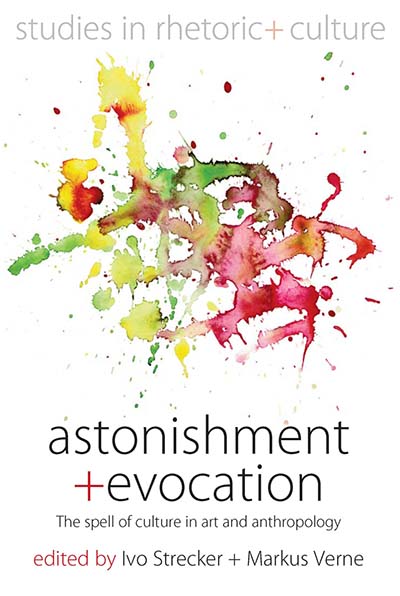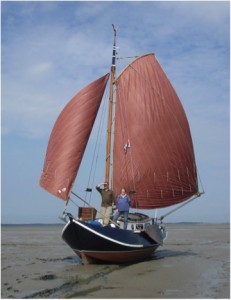Astonishment and Evocation: The Spell of Culture in Art and Anthropology, published last month, addresses the rhetorical turn in the study of human and social sciences, with emphasis on the human reaction to and interaction with the magic of media and art. Below, co-editor Ivo Strecker spellbinds the reader with a discussion of this rhetorical turn in the study of culture.
_____________________________

I returned home from attending Ronald Soeteart and Kris Rutten’s exciting conference on “Rhetoric as Equipment for Living: Kenneth Burke, Culture and Education” (Ghent, 22-25 May 2013) and find (in my dream-mail) news that a grand book launch of Astonishment + Evocation. The Spell of Culture in Art and Anthropology is imminent with the press, television, authors, editors and staff of Berghahn Books present.
Of course, I am all for it. Let’s do it. Let’s indulge in a bit of hyperbole! Let’s have a real, crashing launch, with Marion Berghahn smashing a bottle of champagne at the bough of our book, exclaiming: “Herewith we celebrate the fifth volume of our series Studies in Rhetoric and Culture known for spearheading the rhetorical turn in the study of culture!”
Herbert Simons and I were asked to speak at the first plenary session of the conference in Ghent about “The rhetorical turn in the human and social sciences.” When it was my turn (sic) to speak, I pointed out that, according to Kenneth Burke, the poet is a medicine man who immunizes us by stylistically infecting us. I added that Burke too was a medicine man, which explains the spell he was able to cast – and still casts – on his audiences: His imaginative ways of identifying and naming particular topics of discourse; his ingenious use of figuration; his labeling, sizing things up, identifying and finding key terms – a process he calls “entitlement”; his Faustian ability to “conceal or reveal,” as one commentator says, “magnify or minimize, simplify or complexify, elevate or degrade, link or divide”; and last but not least his great delight in puns, paradoxes, contradictions, irony and the whole realm of the comic.
More than anyone else Kenneth Burke has drawn attention to the rhetorical nature of “entitlement” as he called it, of “sizing up” and finding the right names for particular issues and situations. So I used him in Ghent to answer the question why contemporary scholars have abandoned the once so attractive term revolution and now have begun to favor “turn” for their titles.
Burke would explain the success of “turn” using what he called the “perspective by incongruity.” First he would probably point up the more provocative and comical aspects of the term:
(1) He would say that “turn” means to “move in a circular direction,” and nod his head saying, “Yes, that’s right, human scholarship moves in circles.”
(2) Then he might top this up, saying, “Like the weather cock, the human and social sciences turn with the wind.”
(3) Or he would mock, “The ‘Rhetorical Turn’ gives me quite a turn.”
After indulging in the comic he would go on to explain that when we perceive “turn” not as rotation around a fixed position but as part of movement in space and particularly in time, the notion would positively influence our mental and emotional attitude towards the ventures of science.
When I first read of the linguistic, the symbolic, the rhetorical turn, etc., I responded very positively in my mind and immediately thought of the long and short “turns” I have taken on the Baltic Sea and in the coastal waters of northern Germany. Yes, I said to myself – and heard my friend Stephen Tyler say – study is a journey; It is a voyage into the unknown.
Also, I thought of the two different roles that “turn” plays in sailing. First there is “tacking,” sailing against the wind and performing turns to make headway. This, I think, is what Herbert Simons and his crew of the Rhetoric of Enquiry Movement do. They have decided to sail against the winds of what they mockingly call “objectivist pretensions,” and their volume “The Rhetorical Turn” (1990) was particularly provocative because, for natural science, rhetoric was – and to a large extent still is – anathema.
To stay with the metaphors of movement, journey and sailing the seas, we can say that culture and rhetoric follow the same wind. This is why Stephen Tyler and I, with our crew of the Rhetoric Culture Project, do not need to “tack,” but can perform a different kind of turn. We “jibe,” we change course by simply swinging our fore-and-aft sails across the following wind.
For quite some time, the study of culture has involved explorations of eloquence. As the work of anthropological linguistics, especially the ethnography of speaking attest, scholars were well aware of the fact that much can be gained by studying the different forms of rhetoric that exist in different cultures. By the 70s, anthropologists discovered figuration as a promising new topic of research.
So, in the 70s and 80s the winds of anthropology began to blow, as it were, already towards a study of rhetoric as produced in different cultures. This island of research lay in my mind ahead of us to starboard. But then, from the 90s onwards, when the Rhetoric Culture Project got moving, and we saw ever more clearly that just as culture produces rhetoric, rhetoric produces culture, the situation changed, and I began to visualize the research of rhetoric producing culture lying on an island somewhere ahead of us to port, and somewhat closer to the wind. So in my imagination we swung our fore-and-aft sails across the following wind, thus performing a “jibe.”
But as I tell of these fanciful associations, my wife, anthropologist Jean Lydall, points out: Bound in a chiasmus – rhetoric structures culture, culture structures rhetoric – both inhabit the same island, so you better set the sails to “butterfly”!

__________________________________
Ivo Strecker is Emeritus Professor of cultural anthropology at the Johannes Gutenberg University of Mainz. He did and still does research with the Hamar in southern Ethiopia and has published widely about them. His film Father of the Goats (1984) received the “Prix Nanook” at the Bilan in Paris, and his theoretical study The Social Practice of Symbolization (1988) was selected by Choice as one of the “outstanding academic books of the year.” Together with Stephen Tyler and Robert Hariman he is editor of the Berghahn Books series Studies in Rhetoric and Culture.
Markus Verne is Assistant Professor of anthropology at the University of Bayreuth, Germany. From 2010 to 2012, he was Marie Curie Experienced Researcher at the Department of Ethnomusicology, University of California Los Angeles, and the Department of Anthropology, University of Bayreuth. For his book on consumption and scarcity in a Sahelian village (Der Mangel an Mitteln, 2007) he received the “Research Sponsorship Award” of the Frobenius Society and the “Junior Scientists Award” of the Association of African Studies in Germany.
